2016-2017学年高一英语下册单元测试题26
高中英语真题:2016-2017学年高一英语下学期期中试题_20
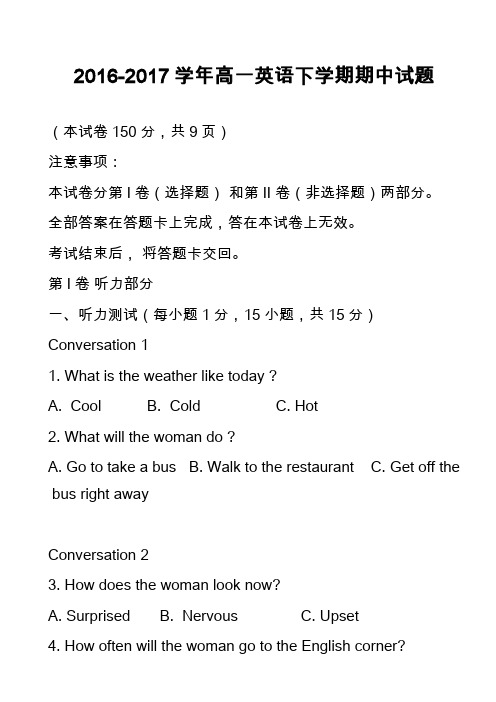
2016-2017学年高一英语下学期期中试题(本试卷150分,共9页)注意事项:本试卷分第I卷(选择题)和第II 卷(非选择题)两部分。
全部答案在答题卡上完成,答在本试卷上无效。
考试结束后,将答题卡交回。
第I卷听力部分一、听力测试(每小题1分,15小题,共15分)Conversation 11. What is the weather like today ?A. CoolB. ColdC. Hot2. What will the woman do ?A. Go to take a busB. Walk to the restaurantC. Get off the bus right awayConversation 23. How does the woman look now?A. SurprisedB. NervousC. Upset4. How often will the woman go to the English corner?A. Once a week.B. Twice a week .C. Three times a week.Conversation 35. What does the woman want to be?A. An English teacher.B. A music teacher .C. A singer.6. What does the man want to be?A. An astronautB. A teacherC. singerConversation 47. Why didn’t the woman go to New Zealand?A. She couldn’t afford the trip.B. She didn’t feel like going there.C. Her friend invited her to Beijing.8. What did the woman do on the fourth and fifth days?A. She visited several attractions.B. She hung out with her friend.C. She watched movies.9. When did the woman go to the Great Wall?A. On the sixth day.B. On the seventh day.C. On the eig hth day.Conversation 510. When will the man’s friends come back?A. Today .B. TomorrowC. The day after tomorrow.11. How much change does the man receive ?A. 8 dollarsB. 12 dollarsC. 28 dollars12. Where does the conversation take place ?A. At the parkB. Over the phone.C. At the booking office.Conversation 613. What is William most probably doing now?A. Playing football.B. Visiting ThomasC. Buying a ball14. What will the woman do tomorrow?A. Visit her auntB. Take care of a kid.C. Go out of town15. Where does Catherine live ?A. Near the woman’s house .B. near the man’s houseC. Ne ar the cinema第II卷笔试部分第一部分阅读理解(共两节;满分40分)第一节(共15小题,每题2分,满分30分)(A)Many teenagers feel that the most important people in their li ves are their friends. They believe that their family members d on’t know them as well as their friends do. In large families, it i s quite often for brothers and sisters to fight with each other a nd then they can only go to their friends for some ideas.It is very important for teenagers to have one good friend or a group of friends. Even when they are not with their friends, th ey usually spend a lot of time talking among them on the phon e. This communication is very important in children’s growing up, because friends can discuss something. These things are difficult to say to their family members.However, parents often try to choose their children’s friends f or them. Some parents even stop their children from meeting t heir good friends. Have you ever thought of the following ques tions?Who chooses your friends? Do you choose your friends or yo ur friends choose you? Have you got a good friend your paren ts don’t like? Your answers are welcome.16.Many teenagers think that______ can understand them bet ter.A friends B. brothers C. sisters D. parents17.________ is very important to teenagers.A. To make friendsB. CommunicationC. To stop meeting friendsD. Both A and B18.The sentence “Your answers are welcome” means “______ ___”.A. You are welcome to discuss the questions with usB. We’ve got no idea, so your answers are welcomeC. Your answers are always rightD. You can give us all the right answers(B)Reach for the stars at the Euro Space Center. Find out everyt hing you need to know about space — from the origins (起源) of the universe to the future space exploration plans. Light , sound and special effects help to bring your space journey to life. Throughout your tour, our specially trained guides will an swer your questions and provide you with any information you require.Begin your tour with our exhibition about the planets, then mo ve on to the Space Laboratory and see some of the experime nts carried out in space. Visit our international space station, where you can climb into our full-scale Space Shuttle model and experience life on board as an astronaut.You will know all about space by now and to help you further, our Space Center astronaut will tell you about how young peo ple train as astronauts in our own training school. Finally, you can watch our amazing Space Show in our IMAX cinema, whi ch will help you understand everything you have learned durin g your visit better.Outside we have an outdoor exhibition including a giant solar system, full-size rocket models and outdoor games. Don’t worry if it rains — much of this is under cover.After that, why not visit our restaurant Resto Space for food a nd drink on a space theme ? And don’t forget our Space Shop , offering you a lot of gifts to take home.The Euro Space Center is open every day during school holid ays, and also during other times except Mondays. Opening ti mes are 10:00-5:00. For entrance fees, call our booking service on + 32-61-650133. Or you can email us for up-to-date entry information at info@eurospacecenter.be.19. Anyone who goes to the Euro Space Center will _____A. visit there for freeB. become a true astronautC. feel as if he was in spaceD. do any space experiments he wants20. In the Space Shuttle, visitors can _____.A. enjoy food and drinkB. watch an amazing space showC. learn about space experimentsD. know how astronauts live in space21. On Mondays, the Euro Space Center _____.A. will be open all day longB. will be open only for 5 hoursC. will be closed for the whole dayD. will have a space show in the IMAX cinema22. What’s the best title for the text?A. Learn to be an astronautB. Welcome to Space ShopC. Come and take a space walkD. Show your talent for science(C)A well-dressed man entered a famous jewelry shop. He explained th at he wished to buy a pearl(珍珠)for his wife’s birthday. The price didn’t matter, since business had been very good for him that year. After examining a nice black one that cost $5, 000, he paid for the pearl in cash, sho ok hands with the jeweler and left.A few days later the man returned and said that his wife like d the pearl so much that she wanted another one just like this. It had to be exactly the same size and quality, as she wanted a pair of earrings made. "Can you give me any advice on ho w to get such a pearl?" said the man. The jeweler regretfully r eplied "I would say it’s absolutely impossible to find one exactl y like that pearl".The rich man insisted that the jeweler advertise in the newsp apers, offering $25,000 for the matching pearl. Many people a nswered the advertisement(广告) but nobody had a pearl that was just right.Just when the jeweler had given up hope, a little old lady cam e into his store. To his great surprise, she pulled the perfect p earl from her purse." "I don’t like to part with it”, she said sadly . “I got it from my mother, and my mother got it from hers. But I really need the money”.The jeweler was quick to pay her before she changed her mind. Then he called the rich man’s hotel to tell him the good new s. The man however was nowhere to be found.23. Who did the man pretend to buy a pearl for?A. His wife.B. His mother-in -law.C. His own mother.D. No one.24. Why did he pay $5,000 for the black pearl without bargaini ng?A. Because he was very rich.B. Because he wanted to make the jeweler believe him.C. Because his wife was anxious to get it.D. Because his business had been successful.25. Why did many people answer the advertisement?A. Because they wanted to see the perfect pearl.B. Because they wanted to buy some beautiful pearl too.C. Because they wanted to get in touch with the rich man.D. Because they wanted to sell their own pearl at a high pric e.26. The jeweler couldn’t find the man anywhere because ____ ______.A. he died suddenlyB. he happened to be outC. he got $20,000 by cheating and had run away with the m oneyD. he wouldn’t show up until the jeweler called him a second ti me Ramadan(D)London has more than nine million visitors every year. They c ome and visit some of the most famous places in England: Bi g Ben, the Tower of London and the River Thames.You can see some of the most interesting places in London b y getting on the tour buses. Or you can take a ride on the Lon don Eye. This large wheel slowly takes you 135m above the River Thames.The River Thames is London’s main waterway. It has shaped the capital’s landscape, history and geography. So one of the best ways of making sense of the city is to take a trip along th e river.The clock tower of the House of Parliament, Big Ben, has bec ome one of the main symbols of London. The sound of the bel l, which you can hear at the beginning of many television and radio programmes has become well-known throughout the nation.No visit to London is complete without a look at the Tower of London, in the eastern part of the city. After Big Ben, the Tow er may be London’s most visited tourist spot. Directly south is Tower Bridge, which is more than 100 years old.Among all the palaces in London, Buckingham Palace is the most famous. It has been the main London home of the royal family since Queen Victoria moved there in 1837. You can visi t some of the rooms in August and September. And most mor nings of the year you can watch the soldiers outside changing the guard.About one hour by train out of London is the town of Windsor. Here you can visit another of the Queen’s homes---Windsor Castle. There was a fire in 1992 and many of the roo ms were badly burned. But now they are full of beautiful pictur es, tables and chairs again.Sightseeing in London is great, but it can get very tiring. So, t he best way to start the day is to fill up with an English breakf ast.You can buy an English breakfast in nearly every hotel, and at many restaurants and cafes. An English pub is a good place t o stop for lunch and a drink. You can get hot or cold food and try one of England’s many ales (浓啤酒). Fish and chips are also a traditional English meal. So look out for fish and chip shops in cities as well as by the sea. Or you can sit outside one of the many roadside pubs and caf es in London, and simply watch the busy world go by.27. The underlined word “landscape”(paragraph3) is closest i n meaning to ______.A. sightsB. interestC. growthD. travel28. Which place may be London’s most visited tourist spot?A. The River ThamesB. The Tower of LondonC. Buckingham PalaceD. Big Ben29. If you go to London in December, you will not be able to _ _____.A. visit Windsor CastleB. tour the Buckingham PalaceC. tour the city along the River ThamesD. watch the soldiers outside changing guards30. We can learn from the text that _______________.A. the sound of the Big Ben can be heard everywhereB. Windsor Castle has been rebuiltC. only some of the hotels in England serve breakfastD. the London Eye can carry you where you like to go第二节(共5小题,每题2分,满分10分)根据短文内容,从短文后的选项中选出能填入空白处的最佳选项,选项中有两项为多余选项。
高中英语真题:2016-2017学年高一英语下学期周测试题(2.14)

2016-2017学年高一英语下学期周测试题(2.14)时间:80分钟满分:150分I卷(共110分)一.听力(共20分)第一节(共5小题:每小题1分,满分5分)1. What will Lucy do at 11:30 tomorrow?A. Go out for lunch.B. See her dentist.C. Visit a friend.2. What is the weather like now?A. It’s sunny.B. It’s rainy.C. It’s cloudy .3. Why does the man talk to Dr. Simpson?A. To make an apology.B. To ask for help.C. To discuss his studies.4. How will the woman get back from the railway station?A. By train.B. By car.C. By bus.5. What does Jenny decide to do first?A. Look for a job.B. Go on a trip.C. Get an assistant.第二节(共15小题:每小题1分,满分15分)听第6段材料,回答第6、7题。
6. What time is it now?A.1:45B.2:10C.2:157. What will the man do?A. Work on a project.B. See Linda in the library.C. Meet wit h Professor Smith.听第7材料,回答第8至10题。
8. What are the speakers talking about?A. Having guests this weekend.B. Going out for sig htseeing.C. Moving into a new house.9. What is the relationship between the speakers?A. Neighbors.B. Husband and wife.C. Host and visit or.10. What will the man do tomorrow?A. Work in his garden.B. Have a barbecue.C. Do some shopping.听第8料,回答第11至13题。
2016-2017学年第二学期高一级期末考试英语试题(含参考答案)

2016-2017学年第二学期高一年级期末考试英语说明:1.本试卷满分135分,考试时间120分钟。
2.答卷前,考生要务必填写答题卷上的有关项目。
3.选择题选出答案后,用黑色2B铅笔在答题卡上涂黑,不能答在试卷上。
4.非选择题必须用黑色字迹的钢笔或签字笔作答,答案必须写在答题卷各题目指定区域内;如需改动,先划掉原来的答案,然后再写上新的答案;不准使用铅笔和涂改液,不按以上要求作答的答案无效。
5.考生必须保持答题卷的整洁,考试结束后,只交回答题卷以及选择题答题卡。
一、阅读理解(共15小题;每小题2分,满分30分)阅读下列短文,从每题所给的 A.B.C和D项中,选出最佳选项,并在答题卡上将该项涂黑。
AMr. Lee was in bed and was trying to go to sleep when he heard the bell ring. He turned on the light and looked at his clock. It was twelve o'clock. "Who can it be at this time of night?" He thought. He decided to go and find out. So he got off bed, put on his dressing gown (浴袍) and went to the door. When he opened the door, there was nobody there. "That is very strange." Then he went back to his bedroom, took off his dressing gown, got back into bed, turned off the light and tried to go to sleep. A few minutes later he heard the bell again. Mr. Lee jumped out of bed very quickly and rushed to the door. He opened it, but again he found no one there. He closed the door and tried not to feel angry. Then he saw a piece of paper on the floor. He picked it up. There were some words on it : "It is now after midnight(午夜), so it is April Fools’ Day. April fool to you!""Oh, it was the English boy next door!" Mr. Lee exclaimed (惊叫) and almost smiled. He went back to bed and fell asleep at once. The bell did not ring again.1. When did Mr. Lee go to bed?A. before twelve o'clockB. after twelve o'clockC. when the bell rangD. when he saw the boy2. Why did he rush to the door when he heard the bell ring the second time?A. He wanted to open the door for the visitorB. He wanted to find out who the visitor was.C. He was afraid of the ringD. He was waiting for someone.3. From this passage, we learn that we can _______ on April Fools’ Day.A. say "Hello" to each otherB. dance and sing at nightC. play jokes on each otherD. send presents to childrenBAre you thinking about what to do in your free time? Come and join us —Youth Club! Join in lessons a nd activities. It’s fun! For more information, call 34789256!Lessons ActivitiesMonday~Friday6:00 p.m. ~7:30 p.m. Computer lessons for beginnersSaturday and Sunday8: 00 a.m. ~9:00 p.m.Basketball and volleyball playgrounds openMonday and Wednesday7:30 p.m. ~9:30 p.m.Dance lessons for dancer-loversYou can learn and enjoy wonderful dances Monday ~Sunday Swimming pool openTuesday , Thursday and Friday6:30 p.m.~7:30 p.m.Cooking lessonsLearn to cook delicious dishes from all over China The second and last Saturdays of every month7:00 p.m. ~9:30 p.m.Concert timeEnjoy Swedish rock, American jazz and beautiful songs from different parts of theworld!4. On which of the following days can’t you have computer lessons?A. MondayB. WednesdayC. FridayD. Sunday5. Rose is free after 7:20 p.m. Which lessons can she take?A. Computer lessons.B. Dance lessons.C. Cooking lessons.D. Both computer and cooking lessons.6. If Dick wants to swim after playing basketball, when can he go to the club?A. Monday and Wednesday.B. Monday and Sunday.C. Saturday and Sunday.D. Monday and Sunday.7. How often can you enjoy music in the club?A. Twice a month.B. Twice a week.C. Four times a month..D. Five days a week.CWhat is language for? Some people seem to think it's for practicing grammar rules and earning lists of words—the longer the list, the better. That's wrong.Language is for the exchange(交流)of ideas and information.It's meaningless knowing all about a language if you can't use it freely. Many(流利students I have met know hundreds of grammar rules, but they can't speak correctly or fluently 地).They are afraid of making mistakes.One shouldn't be afraid of making mistakes when speaking a foreign language. Native speakers make mistakes and break rules, too.Bernard saw once wrote, "Foreigners often speak English too correctly."But the mistakes that native speakers make are different from those that Chinese students make. They're English mistakes in the English language.And if enough native speakers break a rule, it is no longer a rule. What used to be wrong becomes right.People not only make history, they make language.But a people can only make its own language.It can't make another people's language. So Chinese students of English should pay attention to grammar, but they shouldn't overdo(做过头)it. They should put communication first. 8.Language is used to ________.A.express oneself B.practise grammar rulesB.talk with foreigners only D.learn lists of words9.Generally, when an American or an Englishman speaks English, he ________.A.never makes mistakes B.often makes mistakesC.can't avoid making mistakes D.always makes mistakes10."Foreigners often speak English too correctly."This sentence means that ________.A.foreigners speak correct EnglishB.foreigners speak incorrect EnglishC.foreigners speak English according to the grammar rulesD.foreigners never make mistakes when they speak English11.When we speak a foreign language, we should ________.A.speak in Chinese wayB.speak by the rulesC.speak to native speakersD.not be afraid of making mistakesDEasily, Sleep Well”. Its March 16th is World Sleep Day. This year’s slogan (标语) is “Breatheaim is to celebrate the benefits of good and healthy sleep.Sleep is like food for the brain. Enough sleep helps the body and brain grow and develop. According to the National Sleep Foundation in the US, adults need seven to nine hours of sleep every night. For students aged 10 to 17, a healthy amount is about eight to nine hours per night.But many students don’t get enough sleep because of early school start time and heavyt enough sleep, the China Youth and homework. About 80 percent of middle school students don’t geChildren Research Center reported. For some students, they want to sleep early, but they keepworrying about their schoolwork and can’t fall asleep quickly. For others, they may even haveinsomnia which might keep them awake (醒着的)all night.These sleeping problems greatly affect people’s lives. Experts have shown that lack of sleep teenagers l eads to poor grades. Students without enough sleep cannot pay attention in class or dowell in sports. Also, the lack of sleep may make them depressed (沮丧的).Luckily, with good sleeping habits, it is easier to fall asleep. Some of these good habits includeavoiding drinks that make people excited late in the day, going to sleep at the same time each night, and sleeping in a comfortable place that is dark, quiet, and neither too warm nor too cold.12. If Li Hong is 15years old, how much sleep does she need every night?A. 10-12 hours.B. 8-9 hours.C. 7 hours.D. Less than 7 hours.enough sleep?13. What might happen if teenager s don’t getA. They might do well in sports.B. Their bodies and brains might grow better.C. They might feel depressed.D. They might not be able to finish their schoolwork.14. The underlined word “insomnia” means “_______” in Chinese.A. 健忘症B. 肥胖症C. 多动症D. 失眠症15. Which of the following are good sleeping habits?a. Sleeping in a bright place.b. Going to bed at the same time.c. Sleeping in a dark and quiet place.d. Drinking something that makes you excited.A. a-bB. a-cC. b-cD. b-d二、语言知识及运用(共两节,满分45分)第一节:完形填空(共20小题;每小题 1.5分,满分30分)阅读下面短文,掌握其大意,然后从16—35各题所给的A、B、C和D项中,选出最佳选项,并在答题卡上将该项涂黑。
高中英语真题:2016---2017学年高一英语下学期第一次月考试卷

2016---2017学年高一英语下学期第一次月考试卷(考试时间:120分钟总分:150分)第I卷(共94分)第一部分:听力(共两节,满分30分)做题时,先将答案标在试卷上。
录音内容结束后,你将有两分钟的时间将试卷上的答案转涂到答题卡上。
第一节(共5小题;每小题1.5分,满分7.5分)听下面5段对话,每段对话后有一个小题。
从题中所给的A,B,C三个选项中选出最佳选项,并标在试卷的相应位置。
听完每段对话后,你都有10秒钟的时间来回答有关小题和阅读下一小题。
每段对话仅读一遍。
例:How much is the shirt?A. £19.15B. £9.15.C. £9.18.答案是B。
1. What will Dorothy do on the weekend?A. Go out with her friend.B.Make some plans.C.Work on her paper.2. What was the normal price of the T-shirt?A. $15.B. $30.C. $50.3. What has the woman decided to do on Sunday afternoon?A. To attend a wedding.B. To visit an exhibition.C. To meeta friend.4. When does the bank close on Saturday?A. At l:00 pm.B. At 3:00 pm.C. At 4:00 pm.5. Where are the speakers?A. In a store.B. In a classroom.C. At a h otel.第二节(共15小题;每小题1.5分,满分22 .5分)听下面5段对话或独自。
每段对话或独白后有几个小题,从题中所给的A、B、C三个选项中选出最佳选项,并标在试卷的相应位置。
高中英语真题:2016-2017学年高一英语下学期期中试题_26

2016-2017学年高一英语下学期期中试题答卷时间:120分钟满分:150分第Ⅰ卷考生须知:本试卷分为第Ⅰ卷(选择题)和第Ⅱ卷(非选择题)。
满分150分,考试时间120分钟;答题前,在答题卷指定区域填写班级、姓名、考场号、座位号及准考证号并填涂相应数字;所有答案必须写在答题卷上,写在试卷上无效。
考试结束后,只需上交答题卷第一部分听力(共两节,满分30分)第一节(共5小题;每题1.5,满分7.5)听下面5段对话。
每段对话后有一个小题,从题中所给的A、B、C三个选项中选出最佳选项,并标在试卷的相应位置。
听完每段对话后,你都有10秒钟的时间来回答有关小题和阅读下一小题。
每段对话仅读一遍。
Where does the conversation probably take place?A. In a restaurant.B. In a store.C. In a hotel. What did the woman think they would do?A. Have a meeting.B. Attend a lecture.C. See an exhibition.What will the man probably do next?A. Eat out for lunch.B. Go back to his work.C. Pi ck up Jenny.4. What’s the relationship between the two speakers?A. Hotel manager and tourist.B. Professor and student.C. Salesman and customer.5. How much will the woman pay for one chair?A. $65.B. $59.C. $62.第二节(共15小题;每小题1.5分,满分22.5)听下面5段对话或独白。
英语2016—2017学年度第二学期高一期中考试题

2016—2017学年第二学期期中高一年级英语试题第一部分听力(共两节,满分15分)第一节听力理解(2段共5小题;每小题2分,满分10分)每段播放两遍。
各段后有几个小题,每段播放前每小题有5秒钟的阅题时间。
请根据各段播放内容及其相关小题,在5秒钟内从题中所给的A、B、C项中选出最佳选项,并在答题卡上将该项涂黑。
听第一段对话,回答第1~2题1. Which of the following countries has the woman been to ?A. Japa n and America.B. Can ada and Australia.C. China and Thailand.2. What does the man say about Norway?A. It snows almost everywhere in wi nter.B. It is cold all the year round.C. It 'very dry in summer.听第二段对话,回答第3~5题。
3. What is the probable relati on ship betwee n the speakers?A. Roommates.B. Family.C. Frie nds.4. Why is the woman surprised?A. The man desig ned his house himself.B. The man put many footballs in his house.C. The man is familiar with many football stars.5. What kind of house does the woman hope to own?A. A football house.B. A motor house.C. An apartme nt.第二节听取信息(共5小题;每小题1分,满分5分)听下面一段独白。
2016-2017学年高一英语下学期期中试卷(含解析)

2016-2017学年高一英语下学期期中试卷(含解析)第一部分阅读理解第一节(共15小题;每小题2分,满分30分)AWelcome to our school. You can do a lot of things here. Com e and join us.1. You may have a chance to introduce your inventions on __ _______.A. SundayB. MondayC. WednesdayD. Friday2. You may learn something about a disease called TB from _ _________.A. Dr. WestB. Mr. MorisonC. Mrs. GreenD. Mr. Thomas3. If you want to learn something about satellites(卫星), you can go to the class from______.A. 8:30 to 11:30 on SundayB. 19:00 to 21:00 on MondayC. 19:30 to 21:00 on WednesdayD. 18:30 to 21:00 on Friday4. If you are not free in the morning, you can’t join in ________ .A. Space and ManB. Personal InventionsC. Computer ScienceD. Modern Medicine【答案】1. A 2. C 3. B 4. B【解析】这是某个学校对外参观展览的时间表。
本篇文章题目较简单,答案都是细节理解题,只需认真阅读原文,到原文对应位置寻找即可。
1. 细节理解题。
根据第一个方框中“you may also bring your own inventions.”可知,周日可以展示自己的发明。
2016-2017下学期高一年级期中考试英语试题及答案
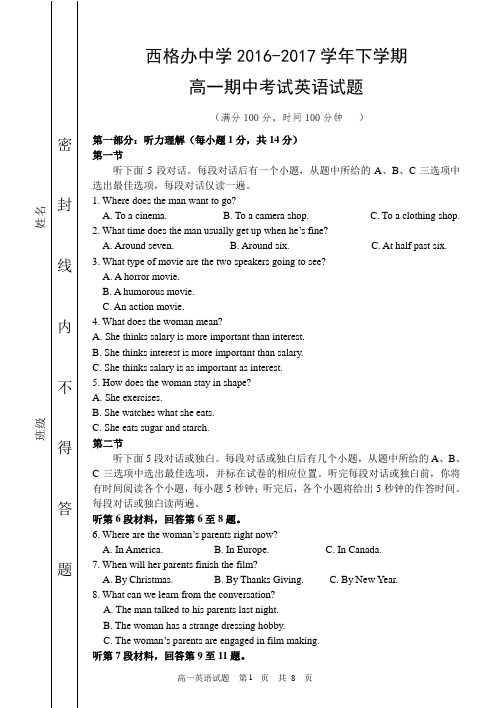
西格办中学2016-2017学年下学期高一期中考试英语试题 (满分100分,时间100分钟 )第一部分:听力理解(每小题1分,共14分) 第一节听下面5段对话。
每段对话后有一个小题,从题中所给的A 、B 、C 三选项中选出最佳选项,每段对话仅读一遍。
1. Where does the man want to go?A. To a cinema.B. To a camera shop.C. To a clothing shop. 2. What time does the man usually get up when he ’s fine?A. Around seven.B. Around six.C. At half past six. 3. What type of movie are the two speakers going to see? A. A horror movie. B. A humorous movie. C. An action movie.4. What does the woman mean?A. She thinks salary is more important than interest.B. She thinks interest is more important than salary.C. She thinks salary is as important as interest. 5. How does the woman stay in shape? A. She exercises.B. She watches what she eats.C. She eats sugar and starch. 第二节听下面5段对话或独白。
每段对话或独白后有几个小题,从题中所给的A 、B 、C 三选项中选出最佳选项,并标在试卷的相应位置。
听完每段对话或独白前,你将有时间阅读各个小题,每小题5秒钟;听完后,各个小题将给出5秒钟的作答时间。
2016-2017学年高一英语下学期期末考试试题_26
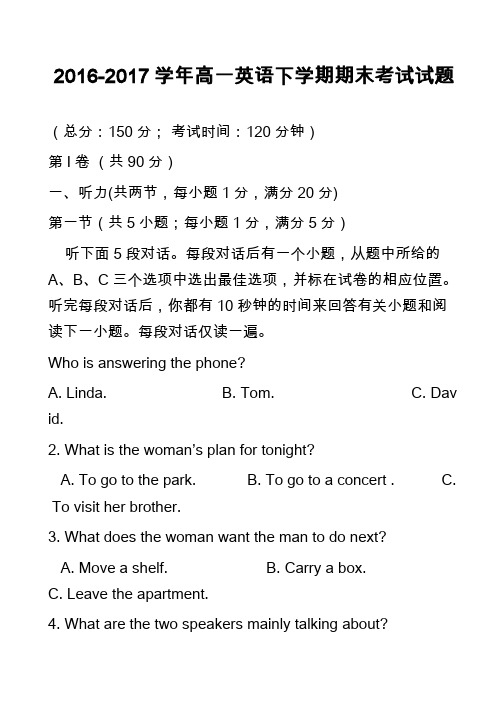
2016-2017学年高一英语下学期期末考试试题(总分:150分;考试时间:120分钟)第I卷(共90分)一、听力(共两节,每小题1分,满分20分)第一节(共5小题;每小题1分,满分5分)听下面5段对话。
每段对话后有一个小题,从题中所给的A、B、C三个选项中选出最佳选项,并标在试卷的相应位置。
听完每段对话后,你都有10秒钟的时间来回答有关小题和阅读下一小题。
每段对话仅读一遍。
Who is answering the phone?A. Linda.B. Tom.C. Dav id.2. What is the woman’s plan for tonight?A. To go to the park.B. To go to a concert .C. To visit her brother.3. What does the woman want the man to do next?A. Move a shelf.B. Carry a box.C. Leave the apartment.4. What are the two speakers mainly talking about?A. When to attend a meeting.B. When to pic k up their parents.C. When to do Christmas shopping.5. When is Mary’s birthday?A. May 13th.B. May 14th.C. M ay 15th第二节(共15小题;每小题1分,满分15分)听下面5段对话或独白。
每段对话或独白后有几个小题,从每题所给的A,B,C三个选项中选出最佳选项,并标在试卷的相应位置。
听每段对话或独白前,你将有时间阅读各个小题,每小题5秒钟;听完后,各小题将给出5秒钟的作答时间。
每段对话或独白读两遍。
请听第6段材料,回答第6至7题。
2016-2017学年度下学期高一年级英语学科期末试卷

2016-2017学年度下学期高一年级英语学科期末试卷本试卷分第I卷(选择题)和第II卷(非选择题)两部分,共150分。
第I卷第一部分:听力(共两节,满分20分)第一节(共5小题;每小题1分,满分5分)听下面5段对话。
每段对话后有一个小题,从题中所给的A、B、C三个选项中选出最佳选项,并标在试卷的相应位置。
听完每段对话后,你都有10秒钟的时间来回答有关小题和阅读下一小题。
每段对话仅读一遍。
Where does the woman want to go very much?A. Italy.B. Russia.C. Egypt.What are the two speakers talking about?A. Tom.B. A photo.C. A car d.Why does the man go back in a hurry?A. To return to the office.B. To meet his brother.C. To do a lot of work.How does the man feel about the bus service?A. Dissatisfied.B. Great.C. Happy What is the man doing?A. Making a phone call.B. Making a visit.C. Applying a post.第二节(共15小题;每小题1分,满分15分)听下面5段对话或独白。
每段对话或独白后有几个小题,从题中所给的A、B、C三个选项中选出最佳选项,并标在试卷的相应位置。
听每段对话或独白前,你将有时间阅读各个小题,每小题5秒钟;听完后,各小题将给出5秒钟的作答时间。
每段对话或独白读两遍。
◆听第6段材料,回答第6、7题。
Why does the man congratulate the woman?She is graduating.She is getting married.She is joining a party.When will the man tell the result to the woman?This Saturday. B. This Sunday. C. Next Monday.◆听第7段材料,回答第8至10题。
高中英语真题:2016-2017学年高一英语下学期第一次段考试题_1
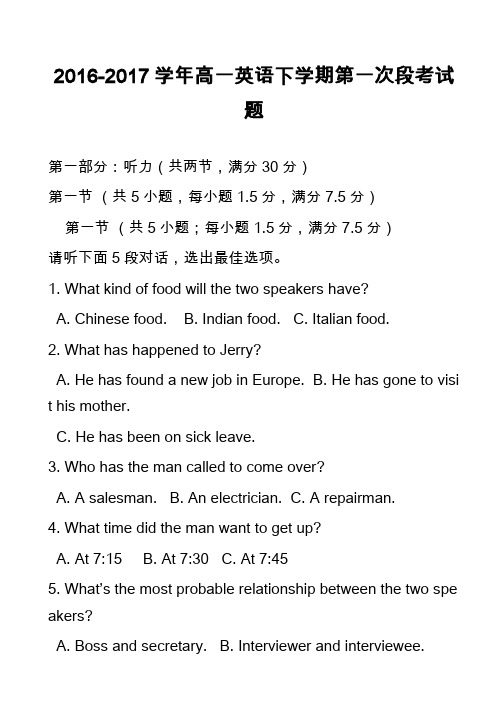
2016-2017学年高一英语下学期第一次段考试题第一部分:听力(共两节,满分30分)第一节(共5小题,每小题1.5分,满分7.5分)第一节(共5小题;每小题1.5分,满分7.5分)请听下面5段对话,选出最佳选项。
1. What kind of food will the two speakers have?A. Chinese food.B. Indian food.C. Italian food.2. What has happened to Jerry?A. He has found a new job in Europe.B. He has gone to visi t his mother.C. He has been on sick leave.3. Who has the man called to come over?A. A salesman.B. An electrician.C. A repairman.4. What time did the man want to get up?A. At 7:15B. At 7:30C. At 7:455. What’s the most probable relationship between the two spe akers?A. Boss and secretary.B. Interviewer and interviewee.C. Customer and assistant.第二节(共15小题;每小题1.5分,满分22.5分)请听下面5段对话或独白,选出最佳选项。
请听第6段材料,回答6-7题。
6. What are the two speakers mainly talking about?A. The written test.B. The driving license.C. The traffic ru les.7. What does the man mean at the end of the conversation?A. He needn’t prepare for the written test.B. He needn’t review the traffic rules.C. He can’t use his common sense.请听第7段材料,回答第8、9题。
高中英语真题:2016-2017学年高一英语下学期第一次调研考试试题
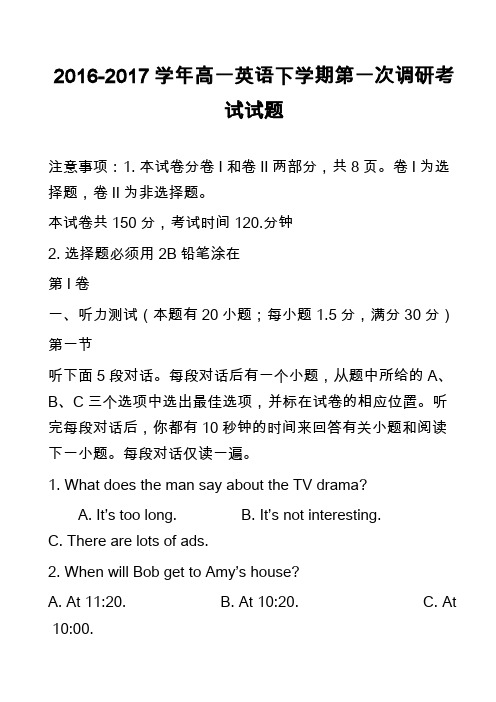
2016-2017学年高一英语下学期第一次调研考试试题注意事项:1. 本试卷分卷I和卷II两部分,共8页。
卷I为选择题,卷II为非选择题。
本试卷共150分,考试时间120.分钟2. 选择题必须用2B铅笔涂在第I卷一、听力测试(本题有20小题;每小题1.5分,满分30分)第一节听下面5段对话。
每段对话后有一个小题,从题中所给的A、B、C三个选项中选出最佳选项,并标在试卷的相应位置。
听完每段对话后,你都有10秒钟的时间来回答有关小题和阅读下一小题。
每段对话仅读一遍。
1. What does the man say about the TV drama?A. It’s too long.B. It’s not interesting.C. There are lots of ads.2. When will Bob get to Amy’s house?A. At 11:20.B. At 10:20.C. At 10:00.3. What kind of music does the man like?A. Jazz.B. Rock.C. Opera.4. Where will the speakers go?A. To the seaside.B. To a playground.C. To a swimming pool.5. How old is the woman now?A. Sixteen years old.B. Fifteen years old.C. Eleven years old.第二节听下面5段对话或独白。
每段对话或独白后有几个小题,从题中所给的A、B、C三个选项中选出最佳选项,并标在试卷的相应位置。
听每段对话或独白前,你将有时间阅读各个小题,每小题5秒钟;听完后,各小题将给出5秒钟的作答时间。
每段对话或独白读两遍。
听第6段材料,回答第6、7题。
6. What does the man want to do?A. Work hard.B. Go to Ireland.C. Pay for the woman’s vacation.7. What does the woman think of her trip last year?A. It cost a lot.B. It wasn’t fun enough.C. It made her exhausted.听第7段材料,回答第8、9题。
高中英语真题:2016-2017学年度第二学期高一级第一次教学质量检测
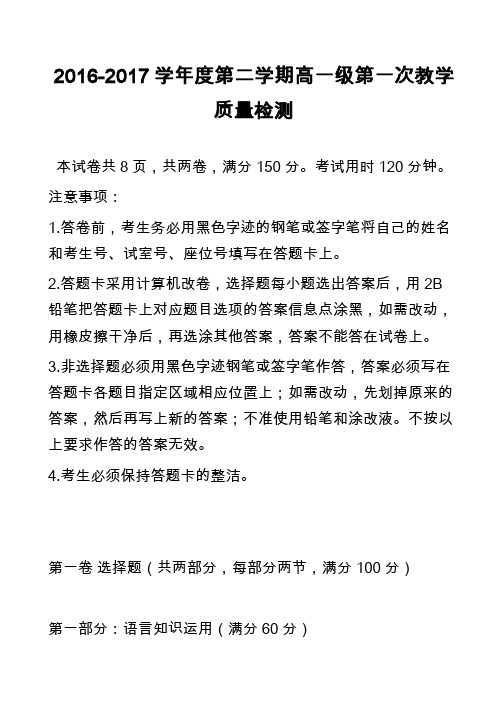
2016-2017学年度第二学期高一级第一次教学质量检测本试卷共8页,共两卷,满分150分。
考试用时120分钟。
注意事项:1.答卷前,考生务必用黑色字迹的钢笔或签字笔将自己的姓名和考生号、试室号、座位号填写在答题卡上。
2.答题卡采用计算机改卷,选择题每小题选出答案后,用2B 铅笔把答题卡上对应题目选项的答案信息点涂黑,如需改动,用橡皮擦干净后,再选涂其他答案,答案不能答在试卷上。
3.非选择题必须用黑色字迹钢笔或签字笔作答,答案必须写在答题卡各题目指定区域相应位置上;如需改动,先划掉原来的答案,然后再写上新的答案;不准使用铅笔和涂改液。
不按以上要求作答的答案无效。
4.考生必须保持答题卡的整洁。
第一卷选择题(共两部分,每部分两节,满分100分)第一部分:语言知识运用(满分60分)第一节选择填空(共15小题,每小题2分,满分30分)1.You ________ park here!It's an emergency exit(紧急出口).A.wouldn't B.needn't C.couldn't D.mustn't 2.He_______ drawing.A. likeB. likesC. to likeD. liking3.________ our surprise, when the audience saw this film, th ey all shouted ______ surprise.A.In ; inB.In ; atC.To ; inD.To ; at4.This is the first time that we ____________a film in the newl y-built cinema together.A. seeB. had seenC. sawD. have seen 5.The number of people in the party _____fifty, but a number of them ____ absent for different reasons.A. were; wasB. was; wasC. was; wereD. were; were6.He asked us ________ we saw the lost cat or not.A. thatB. whatC. whichD. whet her7.It was at 5 o’clock __________ the visitors finally arrived at Pudong International Airport.A. whenB. thatC. beforeD. after8.Along the way children ______ long wool coats stopped to look at us.A. dressing inB. dressingC. dressed inD. d ressed9.It won’t be a very long time _________ he is in business for himself.A. untilB. whenC. beforeD. that10.They considered ______a computer, which was considered ______a great help in their work.A.to buy; to be B.buying; being C.to buy; bein g D.buying; to be11.---Are you satisfied with what she has done?---Not a little. It can’t be ________.A. any worseB. any betterC. so wellD. so bad 12.I shall never forget those years _______ I lived in the cou ntry with the farmers, ______ has a great effect on my life.A.that; whichB.when; whichC.which; thatD.wh en; who13.You’d better ______ it as soon as possible. We have a lot of work to do.A finishedB finishC to finishD finishes14. I found _________ hard to make myself understood by the old man.A. meB. itC. himD. this15.I was about to go to bed _____ one of my old classmates made a call to me.A. thatB. asC. whileD. when第二节:完形填空(共20小题,每小题1.5分,满分30分)阅读下面短文,从短文后所给各题的四个选项(A、B、C和D)中,选出可以填入空白处的最佳选项,并在答题卡上将该项涂黑。
内蒙古集宁20162017学年高一下学期6月份月考英语试题Word版含答案
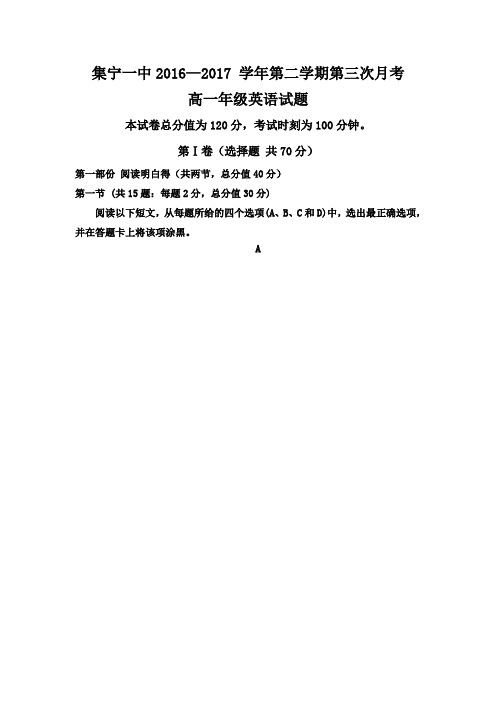
集宁一中2016—2017 学年第二学期第三次月考高一年级英语试题本试卷总分值为120分,考试时刻为100分钟。
第Ⅰ卷(选择题共70分)第一部份阅读明白得(共两节,总分值40分)第一节(共15题:每题2分,总分值30分)阅读以下短文,从每题所给的四个选项(A、B、C和D)中,选出最正确选项,并在答题卡上将该项涂黑。
ATwo teachers are greatly needed in Zhejiang Province!8000~9000 RMB/month (25 lessons/week) plus benefits!The school is located in Yuhang Town, which is only two hours away from Hangzhou City by bus.Requirements:Native English speakers from Australia, Canada, UK, etc. Bachelor’degree and teaching experience.We offer:Airfare reimbursement (补助) & Travel bonusA spacious, private and on-campus apartment with the following items included:Computer with free Internet access; Telephone; Color TV; Heater; Washing machine; Refrigerator; Microwave; Cooking facilities (plates, glasses, cups, pots and pans, etc.) Water dispenser (饮水机); Westernstyle toilet; Bath-tub; Non-stop hot waterTo apply for the job, please send your resume to.Application:To apply for the job, please don’t forget to include the following information:Personal data (age, place of birth, etc.)Description of your academic history and teaching experienceA recent pictureScanned documents, such as diploma(s), passport and current visa ( if already in China)A phone number where we can reach youFor inquiries, call + 86 (871)3803085;1. This advertisement is planned to _______.A. take on English teachersB. introduce a schoolC. attract foreign studentsD. arrange the subjects2. What is NOT needed for you to apply for the job?A. Your resumeB. Your personal dataC. Your academic historyD. A recommendation letter.3. If you are employed, you may _______.A. live far away from the campusB. share a room with another teacherC. surf the Internet for freeD. enjoy three free meals every day4. Where are you likely to read the advertisement?A. In a telephone bookB. In a newspaperC. In a travel guideD. In a textbookBPapa, as a son of a dirt-poor farmer, left school early and went to work in a factory, for education was for the rich then. So, the world became his school. With great interest, he read everything he could lay his hands on, listened to the town elders and learned about the world beyond his tiny hometown. “There’s so much to learn.”He’d say. “Though we’re born stupid, only the stupid remain that way.” He was determined that none of his children would be denied(拒绝) an education.Thus, Papa insisted that we learn at least one new thing each day. Though, as children, we thought this was crazy, it would never have occurred to us to deny Papa a request. And dinner time seemed perfect for sharing what we had learned. We would talk about the news of the day; no matter how insignificant, it was never taken lightly. Papa would listen carefully and was ready with some comment, always to the point.Then came the moment---the time to share the day’s new learning.Papa, at the head of the table, would push back his chair and pour a glass of red wine, ready to listen.“Felice,” he’d say, “tell me what you learned today.”“I learned that the population of Nepal is …”Silence.Papa was thinking about what was said, as if the salvation(拯救)of the world would depend upon it. “The population of Nepal. Hmm. Well …” he’d say. “Get the map; let’s say where Nepal is.” And the whole family went on a search for Nepal.This same experience was repeated until each family member had a turn. Dinner ended only after we had a clear understanding of at least half a dozen such facts.As children, we thought very little about these educational wonders. Our family, however, was growing together, sharing experiences and participating in one another’s education. And by looking at us, listening to us, respecting our input, affirming(确信) our value, giving us a sense of dignity, Papa was unquestionably our most influential teacher.Later during my training as a future teacher, I studied with some of the most famous educators. They were imparting(教授) what Papa had known all along--- the value of continual learning. His technique has served me well all my life. Not a single day has been wasted, though I can never tell when knowing the population of Nepal might prove useful.5.What do we know from the first paragraph?A.The author’s father was born in a worker’s family.B.Those born stupid could not change their life.C.The town elders wanted to learn about the world.D.The poor could hardly afford school education.6.It can be learned from the passage that the author _______.A.enjoyed talking about newsB. knew very well about NepalC.felt regret about those wasted daysD. appreciated his father’s educational technique7. What is the greatest value of “dinner time” to the author?A. Continual learningB. Showing talentsC. Family get-togetherD. Winning Papa’s approval8. The author’s father can be best described as _______.A. an educator expert at training future teachersB. a parent insistent on his children’s educationC. a participant willing to share his knowledgeD. a teacher strict about everything his students didCYou may not have heard of Ashoka, but for the past 27 years, this association, founded by Bill Drayton, has fought poverty(贫困) and sickness, promoted education and encouraged small business. To support these worthy causes, Ashoka provides money for the world’s most promising “changemakers”seeking to solve urgent problems and would like to create a world in which every citizen is a changemaker.Drayton believes that anyone can become an agent for change. The important thing is to simply give yourself permission. If you see a problem that you care about, you can help solve it. The young in particular are willing to accept this concept(观念) because at heart every child wants to grow into a happy, healthy, contributing adult. In fact, it is many young people’s ambition to set up programmes or businesses that improve social conditions. An excellent example is an Ashoka project started in 1995 in Dhaka, which handled the rubbish problem facing the city, helped local farmers and provided an income for poor people there.When Masqsood and Iftekhar began to study the problem of all the uncollected rubbish that lay in Dhaka’s streets, attracting rats and disease, they discovered that 80% of it was natural waste. So they educated the poor people in the city to compost(把……制成堆肥) this waste. They knew that they would have a market for the end product because localfarmers were struggling with chemical fertilizers which were expensive and had reduced the natural minerals in the soil over the years. At first, they were refused, but once they were able to persuade them that there was money to be made, the project took off. In 2020 sales were $14,000. Drayton is optimistic that in ten years Ashoka will be making really serious, practical progress in bringing about social change by changing the way we look at economic development.9.Which of the following could be the best title for the passage?A.ChangemakersB. BusinsssmenC. Social ConditionsD. Rubbish Problem10.The underlined word “them”in Paragraph 3 refers to “__________”.A. the local farmersB. Masqsood and IftekharC. Drayton and his teamD. the poor people in Dhaka11. It can be concluded from the passage that anyone can become achangemaker if he_________.A. considers Drayton’s conceptB. gets permission from AshokaC. tries to improve social conditionsD. is a young, happy and healthy adult12. The author’s attitude towards Ashoka’s program can be described as_______.A. changingB. forgivingC. negativeD. positiveDThe United Nations Environment Programme is calling for urgent action to reduce growing risks from chemicals. Better management of chemicals could save millions of lives and billions of dollars. As estimated(估量), 143,000 chemicals are now produced. Yet the report says only a small number of these chemicals have been studied for their effects on human health and the environment. It says death and disability rates are high from the unsafe use of chemical products.Sylvie Lemmet, director of the United Nations Environment Programme, says poor management of chemicals has a high economic cost. For example, she says the cost is higher than the amount of overseas development aid, or ODA, for health care in sub-Saharan Africa.She says, “If you look at the estimated cost of poisoning from pesticide (杀虫剂) in sub-Saharan Africa, only the injury and the loss of working time is estimated to be billion US dollars in 2020. This is higher than the total ODA that is going to the health sector in the same area.”The United Nations Environment Programme estimates that chemical sales worldwide will increase by around three percent a year until 2050. Chemical production is moving quickly from developed to developing countries. By 2020, chemical production is expected to increase by 40 percent in Africa and the Middle East and 33 percent in Latin America. One of its biggest concerns is pollution of rivers and lakes by pesticide and fertilizers. Other major concerns are heavy metal pollution from the production of cement and textiles, and dioxin pollution from mining. The UN report urges the chemical industry and governments to work together to develop safety policies. It says preventing harm costs less than fixing it.13. The purpose of Paragraph 3 is mainly to indicate that _______.A. the use of pesticide causes a great loss.B. Africa needs more development aidC. chemicals have a high production costD. the estimated cost of poisoning from pesticide is inaccurate14. Which of the following is Not a source of danger according to the text?A. PesticideB. FertilizerC. Heavy metalsD. Minerals15. According to the text, what is the main reason for the risks fromchemicals?A. Poor management of chemicalsB. Lack of research funds on chemicalsC. The mass production of cement and textilesD. Difference between chemical producers and governments第二节(共5小题;每题2分,总分值10分)依照短文内容,从短文后的选项当选出能填入空白处的最正确选项。
2016-2017学年高一英语下学期第二次阶段考试试题
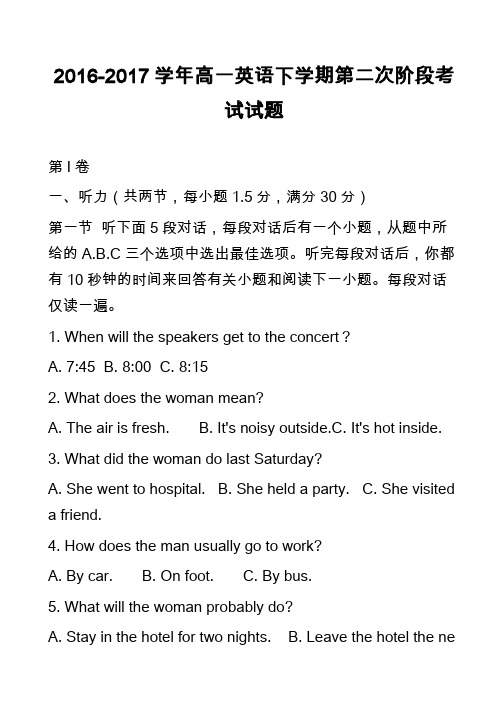
2016-2017学年高一英语下学期第二次阶段考试试题第I卷一、听力(共两节,每小题1.5分,满分30分)第一节听下面5段对话,每段对话后有一个小题,从题中所给的A.B.C三个选项中选出最佳选项。
听完每段对话后,你都有10秒钟的时间来回答有关小题和阅读下一小题。
每段对话仅读一遍。
1. When will the speakers get to the concert?A. 7:45B. 8:00C. 8:152. What does the woman mean?A. The air is fresh.B. It's noisy outside.C. It's hot inside.3. What did the woman do last Saturday?A. She went to hospital.B. She held a party.C. She visiteda friend.4. How does the man usually go to work?A. By car.B. On foot.C. By bus.5. What will the woman probably do?A. Stay in the hotel for two nights.B. Leave the hotel the next morning.C. Ask the man for her room key.第二节听下面5段对话或独白。
每段对话或独白后有几个小题。
从题中所给的A.B.C三个选项中选出最佳选项。
听每段对话或独白前,你将有时间阅读各个小题,每小题5秒钟;听完后各小题将给出5秒钟的作答时间。
每段对话或独白读两遍。
听下面一段对话,回答第6和第7两个小题。
6. How is Mike now?A. Fine.B. Injured.C. Very busy.7. What's the relationship between Tom and Mike?A. Classmates.B. Teacher and student.C. Workmates.听下面一段对话,回答第8和第9两个小题。
2016-2017学年高一英语下学期第二次阶段考试试题_1

2016-2017学年高一英语下学期第二次阶段考试试题本试卷由四个部分组成。
其中第一、第二和第三部分的第一节为选择题。
第三部分的第二节和第四部分为非选择题。
试卷共12页,满分150分,考试时间120分钟。
考试结束后,将答题卡交回。
第一部分:听力(共两节,满分30分)做题时,先将答案标在试卷上,录音内容结束后,你将有两分钟的时间将试卷上的答案转涂到答题卡上。
第一节(共5小题;每小题1.5分,满分7.5分)听下面5段对话,每段对话后有一个小题,从题中所给的A、B、C三个选项中选出最佳选项,并标在试卷的相应位置。
听完每段对话后,你都有10秒钟的时间来回答有关小题和阅读下一小题。
每段对话仅读一遍。
1. What does the woman mean?A. She is going out next week.B. She needs the car for her family.C. She invites the man to an outing.2. How does Jack feel these days?A. Excited.B. Worried.C. Touched.3. What is the relationship between the speakers?A. Mother and son.B. Doctor and patient.C. Teacher and student.4. What will the speakers probably do this weekend?A. See a movie.B. Buy a refrigerator.C. Eat out in town.5. When will the next train for Chicago leave?A. At 08:30.B. At 10:30.C. At 11:30.第二节(共15小题;每题1.5分,满分22.5分)听下面5段对话或独白。
2016-2017学年度第二学期高一年级第一学段英语试卷
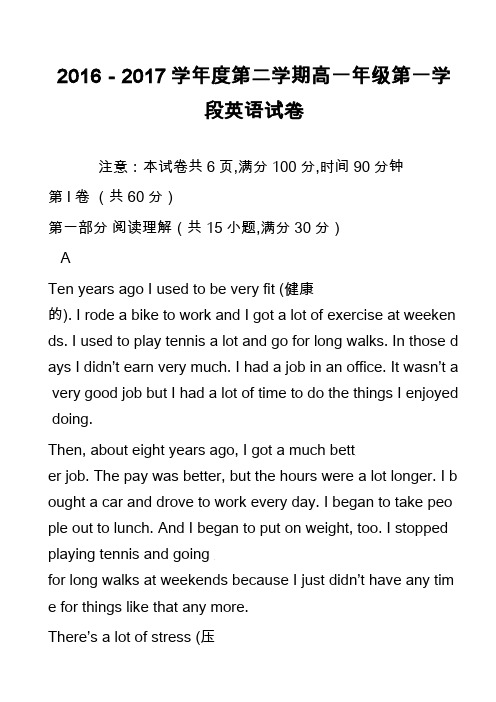
2016-2017学年度第二学期高一年级第一学段英语试卷注意:本试卷共6页,满分100分,时间90分钟第I卷(共60分)第一部分阅读理解(共15小题,满分30分)ATen years ago I used to be very fit (健康的). I rode a bike to work and I got a lot of exercise at weeken ds. I used to play tennis a lot and go for long walks. In those d ays I didn’t earn very much. I had a job in an office. It wasn’t a very good job but I had a lot of time to do the things I enjoyed doing.Then, about eight years ago, I got a much better job. The pay was better, but the hours were a lot longer. I b ought a car and drove to work every day. I began to take peo ple out to lunch. And I began to put on weight, too. I stopped playing tennis and goingfor long walks at weekends because I just didn’t have any tim e for things like that any more.There’s a lot of stress (压力) in my job. Perhaps that’s why I started drinking more than I used to. For example, I used to have only half a glass of whi sky when I got home, but then I started filling my glass to the top, and instead of having one glass, I w ould have several. I started smoking a lot, too. I never used to smoke at all.Two months ago I had a heart attack. At first I just couldn’t bel ieve it. Luckily it wasn’t very serious. The doctor advised me t o stop smoking and to eat less. He also advised me to work le ss and get more exercise. But I just haven’t any time! My job t akes everything out of me!Sometimes I wonder if I should get another job. Perhaps I cou ld do something like I used to do. But if I do that, I won’t earn as much. I have a family to support. I have to think of them, to o. I just don’t know what I should do. What do you think?1. Compared with ten years ago, what is worse for the author now?A. His job.B. His health.C. His pay.D. His means of transport.2. According to the passage, when the author got the better jo b, which of the following is NOT true?A. He got higher pay.B. He found it very stressful.C. He had little free time at weekends.D. His working hours weren’t long.3. After the author had a heart attack, the doctor advised him _____.A. not to work any longerB. to take a long vacation a broadC. to stop smoking and take exerciseD. not to eat out any moreBWe arrived at the hospital only to find Dad weak, but his smile was as sure as ever. My husband and I had to work, so our r elatives would help him get home from the hospital and look after him. But I wanted Dad to know that we cared about him, too, even wh en we weren’t with him.Then I remembered a family tradition (传统) when our children were small. When leaving their g randparents’ home, each child would write a love note for thei r grandparents to find after we were gone. They hid notes in t he food box, or even in the fridge. For days their grandparents would smile as they discovered these notes of the children’s l ove.So as I cleaned Dad’s room downstairs before he got home, I began writing notes. Some showed my love. Most notes were in his room downstairs where he would be able to find, but one note was hidden upstairs under his pillo w. “Dad, if you have found this note, you must be feeling bette r. We are so glad!”My notes were a reminder (提醒的事物) of our love for Dad. Just like his medicines made him bett er physically (身体上), these would improve his mental (精神的) health. Several weeks later, I made a phone call to Dad a nd asked what he was doing. He said, “I’ll tell you what I’m doi ng. I am just reading the note you left under my pillow upstairs !”4. Which of the following did the author NOT do for her father ?A. Driving her father home.B. Writing notes.C. Making phone calls.D. Helping to clean her father’s ro om.5. The underlined word “these” (in Paragraph 4) refers to “___ ___”.A. medicinesB. the relatives’ care and helpC. notesD. delicious foods6. The author hid most notes _____.A. in Dad’s room downstairsB. in the food boxC. in the fridgeD. under Dad’s pillow upstairs7. From the passage we can know the author’s notes couldn’t ______.A. show her love for DadB. make Dad remember som ethingC. make Dad healthier mentallyD. improve Dad’s physical healthCA Frenchman went to a small Italian town and was staying wit h his wife at the best hotel there. One night, he went out for a walk alone. It was late and the small street was dark and quiet . Suddenly he felt someone behind him. He turned his head and saw an Italian young man who quickly walked past him. The man was nearly out of sight when the Frenchman suddenly found t hat his watch was gone. He thought that it must be the Italian who had taken his watch. He decided to follow him and get ba ck the watch.Soon the Frenchman caught up with the Italian. Neither of the m understood the other’s language. The Frenchman frightened the Italian with his fist(拳头) and pointed at the Italian’s watch. In the end the Italian ga ve up his watch to the Frenchman.When he returned to the hotel, the Frenchman told his wife w hat had happened. He was greatly surprised when his wife po inted to the watch on the table. Now he realized that by mista ke he had robbed the watch and it was the Italian’s.8. The Frenchman went to a small Italian town _______.A. aloneB. with his friendC. with an ItalianD. with his wife9. One night he went out for _______ alone.A. a rideB. a drinkC. a walkD. rest10. The Italian gave up his watch to him at last because _____ ___.A. he had stolen the watch from the Frenchman.B. he understood what the Frenchman wantedC. he had picked up the watch on his way from workD. he was afraid of the Frenchman11. Who was robbed of the watch on earth?A. The Frenchman was.B. The Italian was.C. Both of them w as.D. Neither of them was.DA famous doctor once received a little child who was badly ill. Thanks to his skill and care, his young patient got well and wa s soon able to get up and run about again.The child’s mother was very much obliged(感激的) to the doctor, and she called on him to thank him for what he had done for her child. “Doctor,” she said, “you have saved my little son. I don’t know how to thank you enough. I feel tha t money alone cannot repay you, so I have made this little pur se with my own hands, as a sign of my gratitude(感激,感谢). I hope you will accept it.” The doctor stood up and said co ldly, “Madam, a little present like that is very nice between frie nds, but a doctor needs to be paid properly for what he has d one.” The lady was so surprised and hurt so much that she co uld not reply for a moment. Then she said quietly, “Perhaps y ou will tell me how much your fee is?”“Fifty pounds”, he answered.The lady opened the little purse and took out four fifty-pound bank notes. She handed one of them to the doctor, an d put the other three back into the purse. She put the purse in to her handbag and, saying good bye to the doctor, went out of the room.12. The lady was thankful to the doctor because ________.A. he had saved her lifeB. he had saved her son’s lifeC. he had lent her some moneyD. he often called on he r13. The doctor refused the lady’s purse because he thought _ _____.A. the purse should be given between friendsB. the purse was too smallC. the lady was not kind to himD. the lady just gave him that purse and wouldn’t give him the medical fee14. What the doctor said ______ the lady.A. worriedB. interestedC. frightenedD. hurt15. How do you think the doctor would feel in the end?A. Sorry and regretB. Sorry and worriedC. Regret and proudD. Excited and proud第二部分英语知识运用第一节完形填空(共20小题,每小题1.5分,满分30分。
- 1、下载文档前请自行甄别文档内容的完整性,平台不提供额外的编辑、内容补充、找答案等附加服务。
- 2、"仅部分预览"的文档,不可在线预览部分如存在完整性等问题,可反馈申请退款(可完整预览的文档不适用该条件!)。
- 3、如文档侵犯您的权益,请联系客服反馈,我们会尽快为您处理(人工客服工作时间:9:00-18:30)。
Module 4 Fine Arts—Western,Chinese and Pop Arts——精美艺术——西方的和中国的,以及流行的艺术核心词汇1.Companies that are polluting and_____________(破坏)the environment must be closed.2.She refused to allow the______________(展览)of her husband’s work.3.The courts were asked to______________(采用)a more flexible approach to young offenders. 4.The color black is____________(传统)associated with mourning.5.Dealing with people is the most important ____________(方面)of my work.6.She was a splendid mimic and loved to____________(模仿)Winston Churchill.7.The police have been____________(观察)his movements.8.I decided to go to the meeting as an____________ (表达)of support.9.He is very____________about his future .He has not____________his ambition of becoming a famous teacher because the____________is that he is not good at teaching.(reality)10.He takes great ____________ in proving others wrong.When he did it, he felt____________. ButI don’t think what he does is____________ .(delight)1.destroying2.exhibition3.adopt4.traditionally5.aspect6.imitate7.observing8.expression9.realistic;realized;reality 10.delight;delighted;delightful高频短语1._________________ 对……厌烦2.________________ 爱好;喜欢;喜爱3.________________ 从……可以看出4.________________ 推迟;拖延5.________________ 一直做;连续不断地干6.________________ 盼望;期望7.________________ 在……的末了/结尾8._________________ 理解;明白;了解9.________________ 处于最好状态;处于全盛时期10.________________ 轮流11.________________ 一系列的;一连串的1.be/get tired of2.be fond of3.tell by4.put off5.go on doing sth.6.look forward to7.at the end of8.make of9.at one’s best 10.take turns 11.a series of重点句式1.Do you like traditional Chinese art ____________ brush and ink?你喜欢用画笔和墨水的中国传统艺术作品吗?2.This is a painting by the Spanish artist,Pablo Picasso, ____________ the greatest western artist of the twentieth century.这是西班牙画家巴勃罗·毕加索的一幅油画,他被认为是20世纪西方最伟大的画家。
3Cubist artists painted objects and people, _______________________________________.在描绘物体或人的时候,立体派画家会同时展现对象的多个不同侧面。
4.Pop art (from the word“popular”)was an important modern art movement ________________ ordinary twentieth century city life.波普艺术(此词源自popular)是一个重要的现代艺术流派,着眼于展现20世纪普通的城市生活。
5.I’m studying art at school,and I enjoy it a lot, __________________________ looking at pictures all the time.我在学校学习艺术,我很开心,虽然老看图可能会看腻。
6.What do you ______________ (it)?你认为它怎么样?ing2.considered to be3.with different aspects of the object or person showing at the same time4.that aimed to show5.although I can get tired of6.make of知识详解① observe vt .& vi. 观察,注意到;遵守(法律、习俗等);庆祝(节日等);评论,评述(回归课本P33)Qi Baishi observed the world of nature very carefully,and his paintings are special because of this.齐白石对自然界观察得很仔细,他的画因此而别具特色。
【归纳总结】①He observed that the key was missing the moment he got home.他一到家就发现钥匙不见了。
②Ben knew that someone had observed him meeting Ryan.本知道有人看到他和瑞安见面了。
③Does everyone observe the speed limit in your country?在你们国家是否人人都遵守限制车速的规定?④She observed that the journey was long and tiring.她说这次旅行又长又累。
【例句探源】★1.Though having lived abroad for years,many Chinese still ________ the traditional customs. A.perform B.possessC.observe D.support解析:选C。
observe在此句中意为“遵守”。
perform履行,执行,表演;possess占有,拥有,摆布,支配;support支持,支援。
2.完成句子Every one i s expected to______________________.人人应该遵守交通规则。
答案:observe the traffic rules【即境活用】② adopt vt. 采纳,采用;收养(回归课本P32)a style of painting adopted by a group of artists一种被一群艺术家所采用的绘画风格【归纳总结】①Having no children of their own, they decided to adopt an orphan.因为他们没有亲生儿女,所以决定领养一个孤儿。
②Many of the suggestions were quickly adopted.许多建议很快就被采纳了。
③The Chinese government has adopted several noise control plans...中国政府已正式通过几条噪音控制方案……【例句探源】【易混辨析】adopt,adapt(1)adopt表示“采纳(意见/计划/方法);采用;收养”等。
(2)adapt表示“适应”时常用adapt oneself to,表示“修改(为……之用)”时常用adapt+n.+for use。
①The children are finding it hard to adapt to their new school.②We’d like to adopt your idea.3.(2009年高考浙江卷)The good thing about children is that they________very easily to new environments.A.adapt B.appealC.attach D.apply解析:选A。
考查短语辨析。
句意:关于孩子们,好的一点是他们很容易适应新环境。
adapt to表示“使适应于”;appeal to表示“对……有吸引力”;attach to表示“(使)相关”;apply to则表示“运用,适用于”。
根据语意,故选A项。
【即境活用】★4.完成句子Our school has ________________________________.我们学校采用了一个新的教学方法。
答案:adopted a new method of teaching③ stand v.站立;忍受;承担n.看台;摊子;立场(回归课本P33)But I can’t stand that picture of a golden haired girl.但我受不了那幅金发女孩儿的画。
【归纳总结】can’t stand sb./sth.不能忍受某人/物can’t stand(sb./sth.)doing sth.不能忍受(某人/物)做……stand by袖手旁观;支持(某人)stand for代表stand out显眼;突出stand on one’s hands/head倒立stand on one’s feet独立①I can’t stand listening to songs like that.我受不了那样的音乐。
